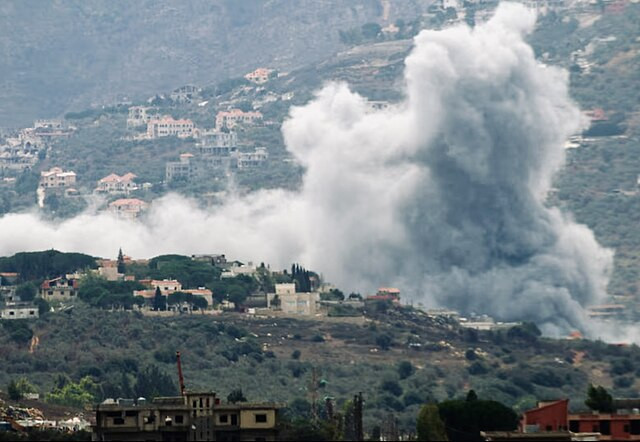In a dramatic escalation of the ongoing conflict between Israel and Hezbollah, tensions flared once again as a drone launched from Lebanon struck a facility in northern Israel, prompting Israeli Defense Forces (IDF) to issue urgent evacuation orders for residents in Hezbollah strongholds deep inside Lebanon. The incident comes as senior U.S. officials head to the region in an effort to broker a ceasefire and halt the escalating violence that has engulfed both nations.
The Israeli military confirmed on Wednesday that a drone hit an aviation plant in the coastal city of Nahariya, causing minimal damage. In response, the IDF issued warnings to residents of Baalbek, a city in northeastern Lebanon known as a Hezbollah stronghold. The military urged civilians to flee, as it prepares to target Hezbollah sites in the area. Baalbek, home to ancient Roman ruins and a UNESCO World Heritage site, has been repeatedly struck by Israeli forces in recent weeks amid a surge in hostilities.
IDF spokesperson Col. Avichay Adraee took to X (formerly Twitter), warning residents to leave immediately. "The IDF will act forcefully against Hezbollah assets inside your city and villages and does not intend to harm you," Adraee stated, attaching a map highlighting the threatened areas. The message prompted panic, with mass evacuations reported in Baalbek as civilians fled their homes, leaving the streets eerily deserted, according to an AFP correspondent.
This latest episode of violence between Israel and Hezbollah has intensified, particularly in the wake of the deadly drone strike on Nahariya. According to the IDF, the drone was detected by military radar only moments before impact, raising concerns about Israel's air defense systems. While the drone strike caused only minor damage to the industrial building it hit, the incident is part of a broader surge in rocket and drone attacks aimed at northern Israel.
The IDF said it downed several other drones in the early hours of Wednesday, adding to the growing tally of attempted attacks. Meanwhile, rocket sirens blared across multiple towns in central Israel, including Netanya and Hadera, after a surface-to-surface missile fired from Lebanon triggered alarms. In the northern town of Metula, two farm workers were injured, one seriously, when a rocket struck nearby.
Lebanon has borne the brunt of Israel's retaliatory strikes, with the death toll mounting. Lebanese authorities reported that Israeli strikes had killed 77 people in the last 24 hours, adding to the nearly 2,800 casualties recorded since Israel began its intensified campaign against Hezbollah in September. Israel maintains that its military actions are aimed at dismantling Hezbollah's infrastructure, which it claims has been embedded within civilian areas.
In a notable strike, Israeli air forces reportedly killed Mustafa Ahmad Shahadi, the deputy commander of Hezbollah's elite Radwan Force, during a raid on Nabatieh, a town in southern Lebanon. Shahadi, according to the IDF, had orchestrated numerous terror attacks against Israel and played a key role in Hezbollah's military operations during the Syrian conflict.
Despite the violence, there may be a glimmer of hope for diplomacy. Two senior U.S. officials-Brett McGurk and Amos Hochstein-are expected to arrive in Israel this week to push for a ceasefire. The officials plan to meet with Israeli Prime Minister Benjamin Netanyahu and other high-level government figures to discuss terms for halting the hostilities between Israel and Hezbollah. According to Israeli media reports, the U.S. delegation is carrying a formal ceasefire proposal, a move that could pave the way for an agreement in the coming weeks.
Israeli Defense Minister Yoav Gallant indicated that Hezbollah's capabilities had been significantly diminished. "I estimate the remaining capacity of the missiles and rockets to be in the order of 20%, and also it is not organized in the way that it used to be," Gallant said on Tuesday, pointing to the effectiveness of Israel's military operations in curbing Hezbollah's firepower.
Meanwhile, northern Israel remains on high alert, with thousands of residents having fled the region after the conflict escalated in early October. The IDF estimates that more than 2,000 Hezbollah fighters have been killed since the fighting began, while the militant group has acknowledged the deaths of over 500 of its members. However, the toll on civilian lives continues to rise, with fears that the conflict could worsen if diplomatic efforts fail to bring an end to the hostilities.




